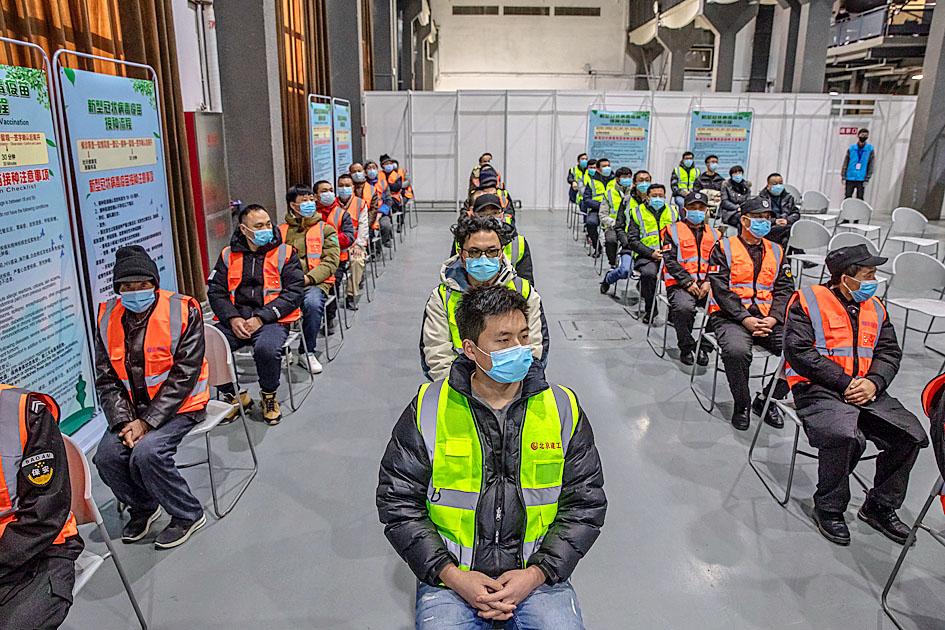China has sent more than 20,000 people living in the epicenter of the country’s latest COVID-19 outbreak to state-run quarantine facilities, as Beijing yesterday reported the worst nationwide figures since March last year.
The country had largely brought the virus under control after strict measures including mass testing and travel restrictions, but case numbers have been climbing, especially in the north, prompting a fresh wave of lockdowns and a race to build a massive new quarantine center.
The government yesterday reported 144 infections — the highest single-day tally since March last year — mostly in Hebei Province, where more than 22 million people are in lockdown.

Photo: EPA-EFE
More than 20,000 residents from villages near Shijiazhuang — about 294km southwest of Beijing — had been sent to quarantine facilities starting from Wednesday, state broadcaster China Central Television (CCTV) said.
They are being housed in hotels, with family members separated.
“It’s natural that they feel anxious and panic,” Liu Jinpei, a psychologist involved, told CCTV, adding that authorities had set up a mental health hotline.

Photo: AFP
Officials are also rushing to build a massive “centralized medical observation center” in the area, with more than 3,000 makeshift beds.
The surge in cases appears to be fueled by asymptomatic cases, mostly in rural areas on the outskirts of cities.
The state-run Global Times warned the high number of cases in the regions “sounds an alarm regarding loopholes in epidemic control” as many residents are elderly.
Hundreds of millions of migrant workers are expected to return to their home villages for the Lunar New Year holiday next month, and China is rushing to vaccinate 50 million people in key groups before the festival.
Meanwhile, Germany yesterday passed 2 million COVID-19 cases as a WHO emergency committee readied to issue advice on stemming the spread of new, more contagious strains of the disease.
The surge in Europe’s biggest economy came as the global death toll from the pandemic approached 2 million, with vaccination drives still in their infancy.
German Chancellor Angela Merkel on Thursday pushed for a “significant” tightening of curbs to slow the infection rate as the nation added more than 22,000 new cases.

Taiwanese actress Barbie Hsu (徐熙媛) has died of pneumonia at the age of 48 while on a trip to Japan, where she contracted influenza during the Lunar New Year holiday, her sister confirmed today through an agent. "Our whole family came to Japan for a trip, and my dearest and most kindhearted sister Barbie Hsu died of influenza-induced pneumonia and unfortunately left us," Hsu's sister and talk show hostess Dee Hsu (徐熙娣) said. "I was grateful to be her sister in this life and that we got to care for and spend time with each other. I will always be grateful to

UNITED: The premier said Trump’s tariff comments provided a great opportunity for the private and public sectors to come together to maintain the nation’s chip advantage The government is considering ways to assist the nation’s semiconductor industry or hosting collaborative projects with the private sector after US President Donald Trump threatened to impose a 100 percent tariff on chips exported to the US, Premier Cho Jung-tai (卓榮泰) said yesterday. Trump on Monday told Republican members of the US Congress about plans to impose sweeping tariffs on semiconductors, steel, aluminum, copper and pharmaceuticals “in the very near future.” “It’s time for the United States to return to the system that made us richer and more powerful than ever before,” Trump said at the Republican Issues Conference in Miami, Florida. “They

REMINDER: Of the 6.78 million doses of flu vaccine Taiwan purchased for this flu season, about 200,000 are still available, an official said, following Big S’ death As news broke of the death of Taiwanese actress and singer Barbie Hsu (徐熙媛), also known as Big S (大S), from severe flu complications, the Centers for Disease Control (CDC) and doctors yesterday urged people at high risk to get vaccinated and be alert to signs of severe illness. Hsu’s family yesterday confirmed that the actress died on a family holiday in Japan due to pneumonia during the Lunar New Year holiday. CDC Deputy Director-General Tseng Shu-hui (曾淑慧) told an impromptu news conference that hospital visits for flu-like illnesses from Jan. 19 to Jan. 25 reached 162,352 — the highest

TAIWAN DEFENSE: The initiative would involve integrating various systems in a fast-paced manner through the use of common software to obstruct a Chinese invasion The first tranche of the US Navy’s “Replicator” initiative aimed at obstructing a Chinese invasion of Taiwan would be ready by August, a US Naval Institute (USNI) News report on Tuesday said. The initiative is part of a larger defense strategy for Taiwan, and would involve launching thousands of uncrewed submarines, surface vessels and aerial vehicles around Taiwan to buy the nation and its partners time to assemble a response. The plan was first made public by the Washington Post in June last year, when it cited comments by US Indo-Pacific Commander Admiral Samuel Paparo on the sidelines of the Shangri-La Dialogue